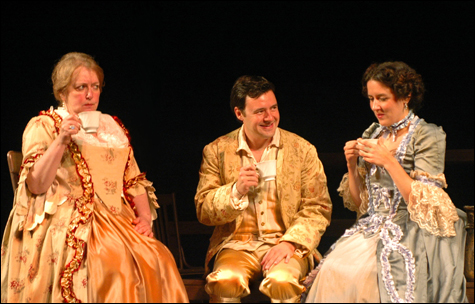
TEA FOR THREE: Splitting the difference at Theater at Monmouth.
|
|
Tom Jones
| adapted by David Greenham from the novel by Henry Fielding | Directed by David Greenham | Produced by the Theater at Monmouth | in repertory through August 24 | 207.933.9999
|
As a professional morality consultant — a philosopher — stands naked and busted in a young woman’s closet, covering his nether region with cupped hands, we in the audience receive a rather acute observation about virtue: “Our morals, it seems,” suggests Henry Fielding’s Tom Jones, “are powered by the sun.” And when we’re out of the light? Well, then virtue tends to become a lot more...practical. A sharp social satire and a delectable comic romp, Tom Jones sends up hypocrisy among British socialites, clerics, and pedants. The Theater at Monmouth’s wizardly David Greenham has adapted Fielding’s 1749 multi-volume novel for the stage, and directs an excellent, exuberant repertory production.
Taking us in hand and guiding us through Tom’s exploits is Henry Fielding himself (the marvelous Dennis Price), a genially intrusive narrator full of knowing asides and lascivious good humor. The hero of his tale, Tom (Mike Anthony), is not the Welsh singer of “It’s Not Unusual,” but an honest young rapscallion, abandoned at birth to the care of the good Squire Allworthy (the venerable Mark S. Cartier, here measured and deep). Our Tom is a lusty ingenue of elevated practical morality. When he’s caught shooting a duck on his neighbor’s land, for example, he lies rather than give up his co-transgressor, and although he lands in the lap of many a desirous woman, these pleasures are all innocently inadvertent, the happy by-products of his practiced virtue.
Tom has long been in love with the virtuous Sophia (Marcy Amell, with great range), the daughter of his boozy bear of a neighbor Squire Western (R. Chris Reeder, full of wild, slurry bravado). Sophia returns the sentiments, but of course there’s plenty to thwart them: As a foundling, Tom is not Allworthy’s first heir, and he’s also known as something of a cad. He’s thus unacceptable to Western and his busybody sister (Maureen Tannian Butler, who’s a hoot), and Sophia runs away in protest of an arranged marriage with Tom’s awful step-brother Blifil (Aaron B. Coleman, nasal and noxious). On top of that, the scheming of Allworthy’s moral thinkers gets Tom unjustly banished from the shire. Tom Jones thus becomes the story of a long journey to London, the capitol of wealth, civilization, and debauchery, with plenty of moral quandaries and beds to be had along the way.
Greenham moves his large and capable cast around nimbly and with high spirit — brawls, seductions, and a near rape are scintillating in their blocking and energy. In a tavern scene, he sets a great throng of his cast to stroking each other, to put on luscious display the drunken patrons’ honest wantonness — which is shared but denied by the stodgy clerics. Far upstage, dimly lit, women and men slowly writhe, caress, and bury themselves happily in each other’s folds. It’s a gorgeous spread and a fine directorial move, though perhaps a touch too lovely and nubile at the expense of good, common bawdiness — one suspects the revelers of being under the influence of acid or E rather than a few gallons of rough ale.
Frequently subject to the pleasures of the flesh himself, Mike Anthony’s Tom is spry and earnest, and does a mean deadpan. Anthony gives Tom a candor that’s at once boyish and heroic. A fine contrast and nemesis for these qualities comes in Janis Stevens’s exquisite, marzipan-and-acid Lady Bellaston, shimmery but steely in silver-gray silk (costumes, by Luke Brown, are consistently stellar). Taking in the runaway Sophia for fun and/or profit and then dangling her before Tom, whom she fancies as a plaything, Bellaston is the quintessence of upper-crust depravity.
But there is also redemption and evolution in Fielding’s tale. Take that philosopher (Dustin Tucker) who was suddenly compromised in the light: He learns something, through the temptations and messiness of real-world circumstances, and finally becomes our touchstone for a human’s ability to adapt. Monmouth’s exuberant and expert production is both a rollicking jaunt and a sharp inquiry into the question of How do we live — not in books and the stark abstract, but in the real, imperfect, concupiscent world; both in full sunlight and in our inescapable dark.
Email the author
Megan Grumbling:
mgrumbling@hotmail.com